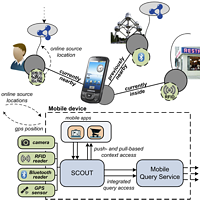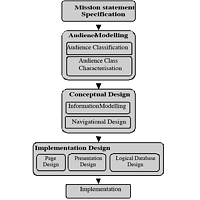Research Projects of sven casteleyn
SCOUT is a mobile application development framework, which supports the development of mobile applications that are aware of the user's context (e.g., profile, device characteristics, ..), his current (physical) environment, and the people, objects and places in it. By exploiting this knowledge on the user and his environment, such applications are able to provide personalized information and services to the user. SCOUT supports different sensing technologies to become aware of the user's surrounding environment (and the physical entities in it), and is primarily based on Web technologies for communication and data acquisition, and Semantic Web technologies for integrating and enriching the knowledge present in the decentralized data sources.
QuTi is a research project performed in the context of iBrussels, a research project on Wi-Fi Architecture financed by the Brussels Capital-Region and supervised by Centrum voor Informatica voor het Brussels Gewest (CIBG). In QuTi, WISE developed a framework that provides real-time information on queue-sensitive events. QuTi relies on existing detection technologies to monitor crowds and measure bustle, and delivers this time-sensitive information real-time through a Web site and a mobile application. Based on this real-time information, visitors can decide when is the best time to visit.
The framework has been applied to measure the traffic in the student restaurant of the VUB.
WISE developed as one of the first few a Web site design method, called WSDM (1998). This method followed a completely new approach in designing Web applications, called the ‘audience driven’ approach, which is nowadays followed by many Web design methods. The original WSDM method, and its associated modeling formalisms has evolved over the years to a complete ‘semantic’ web design method, both applying and deploying semantic web technology, and supporting the generation of semantic annotations. Different master student and PhD students have considered and still consider a variety of additional design issues, such as adaptivity, localization, accessibility, and social tagging, while others have focused on code generation and tool support.




